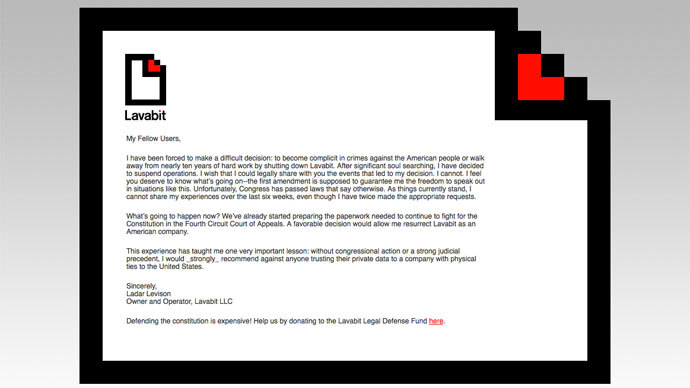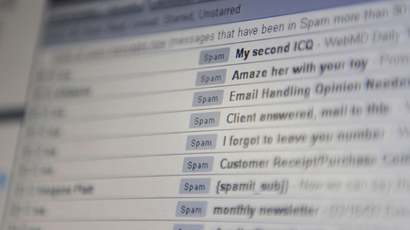Lavabit was targeted by govt day after Snowden went public as NSA leaker

An appeals court filing Friday suggests the US Department of Justice was quick to serve a court order on encrypted email provider Lavabit after customer Edward Snowden, presumably the target, went public as an NSA whistleblower.
Snowden, an NSA contractor who distributed to news outlets
classified information about National Security Agency
mass-surveillance programs, revealed himself as the leaker on
June 9 in Hong Kong. The next day, the Justice Department (DOJ)
demanded Texas-based Lavabit hand over metadata on an unnamed
customer that timing suggests was Snowden, who used Lavabit for
protected email service.
The records order was “issued under 18 USC 2703(d), a 1994
amendment to the Stored Communications Act that allows law
enforcement access to non-content internet records without
demonstrating the ‘probable cause’ needed for a search
warrant,” according to Wired. Such records can include
'To' and 'From' lines in emails and the IP
addresses used to access the account, but not the content of any
emails.
The June 10 order was followed on June 28 with what’s known as a
'pen register order,' an aggressive disclosure which
similarly demands metadata for every new email received or sent
by the account.
On July 9, a court issued an 'Order to Show Cause,' which
indicates the DOJ asked the court to enforce a demand yet to be
complied with to the government’s satisfaction, according to
Wired.
The new revelations come to light via a government filing in
Lavabit’s appeal in the case. Lavabit attorney Jesse Binnall
asked the 4th US Circuit Court of Appeals to
unseal some of the case background so public interest groups were
informed enough to possibly file amicus briefs. The DOJ on Friday
filed its non-public opposition to the unsealing in response. It
also released to the public information about past orders to keep
the case secret.
“The entire record in the district court, including all
applications, subpoenas, motions, warrants, and orders, remains
under seal,” prosecutors wrote in the public offering.
Lavabit owner Ladar Levison shut down the service on August
8, saying to supporters he felt forced to scuttle
Lavabit in order to protect his customers’ privacy rights.
“I have been forced to make a difficult decision: to become
complicit in crimes against the American people or walk away from
nearly 10 years of hard work by shutting down Lavabit,”
Levison wrote in early August. “After significant soul
searching, I have decided to suspend operations.”
Neither Levison, nor his counsel are allowed to discuss the case
or identify whether the target is Snowden.
Wired wrote Levison may have come to his decision after the pen
register order, given Lavabit offers a secure encrypted email
service in which the user is the only one who can access messages
stored. Thus, Lavabit did not have access and could not have
complied without working around its entire privacy system.
Levison appealed the order on August 29. The opening brief
in his appeal is due on October 3.














